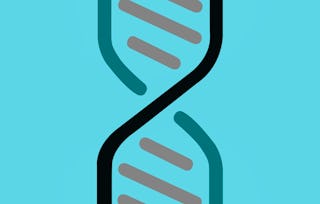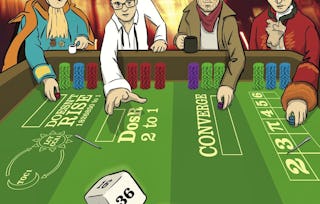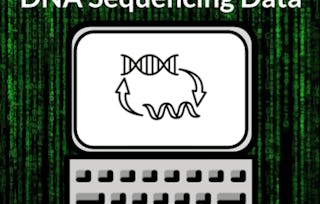Are you a living creature? Then, congratulations! You’ve got DNA. But how much do you really know about the microscopic molecules that make you unique?

1,308 reviews
Skills you'll gain
Details to know

Add to your LinkedIn profile
28 assignments
See how employees at top companies are mastering in-demand skills

There are 4 modules in this course
In this module, we'll explore the molecular structure of DNA. What is DNA? What are the basic building blocks of DNA? Where can you find DNA within a cell? We'll learn about how James Watson and Francis Crick were able to solve the riddle of the molecular structure of DNA by building on the work of other scientists. Their groundbreaking discovery revealed that four nucleobases (adenine, thymine, cytosine, and guanine) combine with sugar and phosphate molecules to form the familiar double helix of DNA. We'll take a look at how the molecular structure of DNA regulates its functions; for example, how the chemical bonds (covalent and noncovalent) between these molecules allow DNA to "unzip" during replication. Then we'll take a look at how you manage to fit over three billion base pairs into each of your cells. (Here's a hint: Histones, nucleosomes, and chromosomes would be great at packing for a trip!)
What's included
7 videos4 readings6 assignments4 discussion prompts
We've all heard DNA described as "the blueprint of life," but what does that actually mean? Each one of the approximately 20,000 genes in our bodies contains the instructions for building a protein. In this module, we'll explain how RNA copies the genetic information contained in our genes and uses this information to assemble amino acids into proteins. Scientists call this concept "Central Dogma": DNA makes RNA and RNA makes protein. We'll also explore how we transmit genetic information from one cell to another -- and what happens when things go wrong. Along the way, we'll learn about techniques (such as polymerase chain reactions and gel electrophoresis) that forensic scientists use in DNA fingerprinting. Join us this week for murder and mayhem in the lab!
What's included
8 videos4 readings9 assignments2 discussion prompts
In this module, we'll explore the techniques scientists use to manipulate DNA. Genetic engineering has allowed us to increase crop yields, diagnose illnesses, develop vaccines, and manufacture insulin. By carefully selecting a pair of molecular scissors (restriction enzymes), scientists are able to isolate a gene of interest and insert it into plasmid DNA, turning a common bacteria (E. coli) into a molecular copying machine. This week, we'll learn that mutations are genetic errors, but that not all mutations are necessarily bad — in fact, some mutations confer a selective advantage that protects against disease. We'll explain what genetically modified organisms are (and what they are not) and weigh in on the heated debates about the ethics and safety of GMOs in popular media.
What's included
8 videos5 readings7 assignments4 discussion prompts
What does your DNA say about you? You may have heard that you share 99% of your genetic material with everyone else on the planet. That's true, but this week we're going to take a look at the less than 1% that makes you unique. We'll kick off by discussing the Human Genome Project, the massive scientific collaboration that mapped out the sequence of all our genetic material. The technologies developed while mapping out the human genome ushered in a new age in DNA research. Now, genome-wide association studies can analyze massive amounts of data, searching for genetic variations that are associated with particular diseases. Pharmacogenomics may help determine which drugs are likely be most effective for you. Genetic genealogy tests (such as Ancestry DNA, 23 and Me, and Family Tree DNA) will allow you to trace random mutations in your DNA that can provide clues to your ethnic heritage. As an added bonus, we'll discuss whether it would be possible to revive extinct species by studying ancient DNA.
What's included
9 videos7 readings6 assignments4 discussion prompts
Instructors

Offered by
Explore more from Basic Science
 Status: Preview
Status: PreviewUniversity of Illinois Urbana-Champaign
 Status: Preview
Status: PreviewUniversity of Cambridge
 Status: Free Trial
Status: Free TrialUniversity of California San Diego
 Status: Free Trial
Status: Free TrialFred Hutchinson Cancer Center
Why people choose Coursera for their career

Felipe M.

Jennifer J.

Larry W.

Chaitanya A.
Learner reviews
- 5 stars
86.46%
- 4 stars
11.23%
- 3 stars
1.68%
- 2 stars
0.38%
- 1 star
0.22%
Showing 3 of 1308
Reviewed on Jan 25, 2023
Dr. Felicia and Dr. Caitlin are really amazing scientists! Their efforts for this course were truly appreciated. I love their energy, and the knowledge they tried to put up was wonderful.
Reviewed on Sep 14, 2020
STUDY BUT FUN!! Make me now more curious about DNA and the amazing information that i can get about my ancestors by testing and analyzing my DNA. I never get bored since the week 1 till the end week!
Reviewed on Aug 3, 2020
Best course ever! The hosts are so supportive and can really encourage participants to learn more about DNA. This course shows that genetics isn't really that hard when you have great teachers!

Open new doors with Coursera Plus
Unlimited access to 10,000+ world-class courses, hands-on projects, and job-ready certificate programs - all included in your subscription
Advance your career with an online degree
Earn a degree from world-class universities - 100% online
Join over 3,400 global companies that choose Coursera for Business
Upskill your employees to excel in the digital economy
Frequently asked questions
To access the course materials, assignments and to earn a Certificate, you will need to purchase the Certificate experience when you enroll in a course. You can try a Free Trial instead, or apply for Financial Aid. The course may offer 'Full Course, No Certificate' instead. This option lets you see all course materials, submit required assessments, and get a final grade. This also means that you will not be able to purchase a Certificate experience.
When you purchase a Certificate you get access to all course materials, including graded assignments. Upon completing the course, your electronic Certificate will be added to your Accomplishments page - from there, you can print your Certificate or add it to your LinkedIn profile.
Yes. In select learning programs, you can apply for financial aid or a scholarship if you can’t afford the enrollment fee. If fin aid or scholarship is available for your learning program selection, you’ll find a link to apply on the description page.
More questions
Financial aid available,



